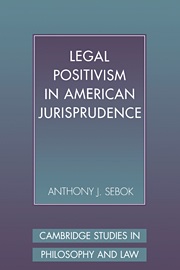Book contents
- Frontmatter
- Contents
- Acknowledgments
- 1 Why Study Legal Positivism?
- 2 Positivism and Formalism
- 3 The Varieties of Formalism
- 4 Legal Process and the Shadow of Positivism
- 5 The False Choice Between the Warren Court and Legal Process
- 6 Fundamental Rights and the Problem of Insatiability
- 7 New Legal Positivism and the Incorporation of Morality
- Index
4 - Legal Process and the Shadow of Positivism
Published online by Cambridge University Press: 16 October 2009
- Frontmatter
- Contents
- Acknowledgments
- 1 Why Study Legal Positivism?
- 2 Positivism and Formalism
- 3 The Varieties of Formalism
- 4 Legal Process and the Shadow of Positivism
- 5 The False Choice Between the Warren Court and Legal Process
- 6 Fundamental Rights and the Problem of Insatiability
- 7 New Legal Positivism and the Incorporation of Morality
- Index
Summary
THE REEVALUATION OF REALISM
It seems commonly assumed by those who study constitutional law or jurisprudence that the legal process school did not possess a legal theory of great sophistication. It is rare, for example, to see the writings of the important scholars of the 1950s and early 1960s in collections that contain realists like Karl Llewellyn and Jerome Frank, or fundamental rights scholars like Ronald Dworkin and Laurence Tribe. Writers working within the legal process tradition did, however, operate with a background theory of law that was a version of legal positivism, although this background theory was not, at the time, called as such.
The point at which I want to begin is, ironically enough, with Henry Hart's 1951 attack on Justice Holmes's alleged legal positivism. Hart attacked Holmes's error of separating law and morality: “The first part [of Holmes's The Path of the Law] explains what law really is – something entirely separate from morals.” Hart equated Holmes's positivism with the central tenets of Llewellynlike realism of the 1930s. Hart (not entirely consistently) argued that the logical extension of Holmes's theory of law was the scientific behavioralism of the most extreme realists, in which “[i]t is not what the judges say which is important, but what they do⃜ [W]e seem to arrive, if we take this path, at the monstrous conclusion that reason and argument, the conscious search for justice, are in vain.”
- Type
- Chapter
- Information
- Legal Positivism in American Jurisprudence , pp. 113 - 178Publisher: Cambridge University PressPrint publication year: 1998



